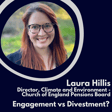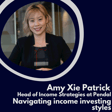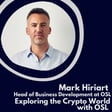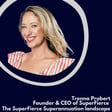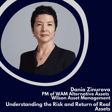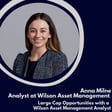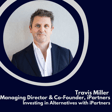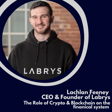Welcome to Alpha Females Invest
00:00:03
Speaker
Welcome back to the Alpha Females Invest podcast, two females working in the finance industry searching for alpha. My name is Clooney. And my name is Emily. And together we bring diversified perspectives from the buy and sell side of the finance world. As usual, any information disclosed in this podcast is not financial advice. All opinions reflect those of the individuals. You should always read the PDS and talk to a financial advisor who can consider your personal circumstances before you invest. And this podcast is intended for education.
Meeting Lee Hatton: Afterpay's Executive VP
00:00:34
Speaker
So today on our show, we have Lee Hatton, Executive Vice President at Afterpay. Lee has more than 20 years experience internationally in the financial services industry and has held senior executive roles in marketing, strategy and risk in large scale customer facing businesses. In 2020, Lee joined the global executive team at Afterpay and is responsible for driving the business's strategy for new products and services.
00:01:01
Speaker
Previously, she was the CEO of UBank from 2015 to 2020, and she's also been recognized by IBM as one of the 40 women leaders in artificial intelligence across the globe for her work in delivering world-first innovations. Lee holds a Bachelor of Business from Auckland University of Technology and is an alumni of Berkeley Haas School of Business. She's also a member of the Chief Executive Women, which represents Australia's most senior and distinguished female leaders.
00:01:30
Speaker
If that's not enough, she's also a non-executive director of Xero and was previously an executive director of NAB Ventures and TEC.
Lee's Career Milestones in Finance
00:01:40
Speaker
Welcome to the show, Lee. Hey there. Thank you so much. It's so cool to be here with you guys. I honestly feel like your bio is just so impressive. We don't even need to do the podcast. Like we should just stop it there. End of show. I was thinking my bio was so boring. I really should get that updated there. Yeah. Anyway, thank you so much. It's very, very kind of you.
00:01:59
Speaker
No, we absolutely love it. And we're so excited to have you on the show today. So as I sort of briefly mentioned, and if you have had the opportunity to listen in to any of our other episodes, we love to start every ep with the same question. So we'll kick it off. And we've had some pretty good ones. So given your huge career, I'm expecting a good story here. But could you share with our listeners, what is your most embarrassing career moment?
00:02:24
Speaker
So, you know, luckily enough, I hadn't heard this one before. So you are getting me, I don't know if it's lucky or not, but you're getting me off the cuff. So, yeah, most embarrassing moment. I was the king. Man, we start. But the one that seems, you know, appropriate, well, it's actually not that appropriate, but I did wear a shirt to work once.
00:02:46
Speaker
Once I was there, I realized it was see-through. I didn't have a resolve for that and someone had to point it out to me. I'd just been busy all day. It was like, hey, lady, do you realize? It wasn't great. I've had a few moments where I could have had very embarrassing moments.
00:03:05
Speaker
One of them would be when Juneau had asked me to kind of jump up on a table and look powerful by putting my hands on my hips. And I remember Amanda who was working with me was like, don't do that, don't do it. And I was like, thank God someone with sanity is with me because I was just about to jump on a chair and get up there.
00:03:25
Speaker
You know, yeah, I think I could have done a lot more embarrassing things, but I've had some good people around me to avoid that from happening. Yeah, there'll be plenty more to come though. We've actually had a few wardrobe mishaps as the embarrassing moment. So it's obviously quite common, which is very funny. And look, I think anyone who heard your bio obviously knows that you've had an incredible career and we're sure that it hasn't yet reached its peak.
From Bank Teller to Banking Leader
00:03:54
Speaker
But for our listeners who don't really know, could you give us a bit of a background on how you got into banking in the first place? Oh, yeah, sure. So, well, I'm a Kiwi. You can probably tell that by my accent. I grew up on a dairy farm in a little town called Inchkin.
00:04:10
Speaker
Maybe like during the 80s, I got hooked on that movie Wall Street or something, but I was just always really fascinated. I guess my money, maybe because I was in a dairy farm, we didn't have much money. I just found it really interesting. This is an embarrassing moment. I had a necklace with a dollar sign on it and it was pretty cool. I will also point out to our listeners that you are wearing a jumper with the words money written up.
00:04:35
Speaker
I'm feeling like there is a theme going on here. I also actually used to sign my name with a dollar sign at the end of it. There is something very weird, very weird going on. Anyhow, so went up to Auckland University. I was looking for the highest paying job at Student Job Search and that was to be a bank teller at Westpac. So that is how I got into financial services.
00:05:00
Speaker
I just never looked back actually. Once I got into that working world, I think I was 18 years old, I was getting maybe $16 an hour and I was just pumped. It was just so awesome. I went on to their graduate program. I did lots and lots of different roles. I loved the fact that
00:05:21
Speaker
you know, you could do customer facing or I really wanted to do a stint in the Ivory Tower because all the important people came from here to office. And so I went into HR for a while and I ran their grad program. Like I just had the most amazing experience. And then I guess I had to go into the real world. So after I'd finished all my studies, it was like, okay, now's the time. What do you want to do? And I headed that into Business Bank.
00:05:50
Speaker
which was where real men lend money. And so if you could, you know, make it with the men, you're going to make it. And so that, you know, that was just fascinating. You know, it was awesome to kind of be a female learning in this environment that was so male dominated. So I did stints in the UK. I did stints in the States. I came back to New Zealand. I followed my mentors around. So one of my mentors from Westpac had gone to Bank of New Zealand.
00:06:17
Speaker
with her, I was fortunate enough to be the Chief of Staff for Andrew Thorburn in 2008 during the GFC. When you're getting into name day crises and all sorts of stuff going on, you just learn so, so much. I ran big businesses like thousands and thousands of people, which actually your job is all about capturing hearts and minds.
00:06:38
Speaker
Then it was awesome to just transfer into tech and just really, I guess always looking forward and seeing what are those trends that are coming out that could actually impact on our today. I don't know, I guess pushing the boundaries on your role every day to think about what if it wasn't here, what would the next thing be? I think Cloud was probably the piece that came for me that really shifted my thinking about what was possible.
00:07:07
Speaker
What finds me here is probably a mixture of financial services, tech, innovation, and just a love of building great products for people. You've basically just said all the buzzwords I think that everyone thinks of when they think of finance. Good to hear they are alive and well. You've obviously held a clear number of really impressive roles previously and currently. I feel it would be amiss of me
00:07:33
Speaker
not to mention and focus on your current role with Afterpay. I'd love to know what excited you about the Afterpay opportunity and, you know, why did you join the company and how are you finding that role different to others, banks or other positions you've held?
The Move to Afterpay: Personal Reasons and Timing
00:07:48
Speaker
So I'd know on the internet.
00:07:50
Speaker
since they had found it after pay. I've known them for a long time. The reason I joined the MHC was deeply personal. I'd been traveling a lot in my career and I decided I didn't want to get on a plane on a Sunday night anymore. I'd taken the most amazing role with amazing people, but I was really missing my boys. I'm a mum of three boys.
00:08:13
Speaker
Yeah, I just decided I didn't want to do that. And of course, if you know those two founders, they are beautiful at luck and time. And so I happened to be going for a walk with Nick and he was like, Oh, maybe now's the time, Lee. Maybe now's the time that you should be joining us.
00:08:30
Speaker
And so, yeah, I think it was a beautiful moment of luck and timing and kind of purpose and joy. And so that's kind of why I'm here. What we really want to do is build the next evolution of Afterpay. We call it the second album. It's all about being as good with savings as we are at spending. You know, we can see there's this massive generational shift in the way that we think about money and we really want to be at the forefront of that and really support
00:08:59
Speaker
Millennial and Gen Z with a way that feels really uplifting and empowering. We're highly trusted as a brand and we take it.
00:09:10
Speaker
So personally, I think we can build something really special for the future. Yeah, that's really exciting and leads on really well to our next question. I guess we've seen more and more business models that are coming to market that are really changing the way that traditional financial services can be viewed and their relationship with the consumer.
00:09:34
Speaker
I guess why do you think the financial services industry is one that is ripe for disruption? I should say, I think I will always be a really proud banker. I grew up in financial services. It taught me everything I know and lots of things I shouldn't know, but I've been really lucky in a way to have learned so much during my career and
00:10:03
Speaker
in large financial institutions. I think the challenge that they grapple with is their ability to connect with the customer. Sometimes, you know, too big to fail is more a commercial term, but I think too big to fail occurs when you lose sight of who your customer is and what they need. And my sense is that we have these amazing financial institutions that are full of very talented people
00:10:30
Speaker
but they short-term results for what is required. That means that you can lose sight on what's really important, which is the customer today that is standing in front of you. That sounds like a Julia Roberts movie waiting to be served. It's just like, yeah, I think that's the piece. I think there is verticals of disruption that will always be there and should be there. We, Afterpay, we can't sit back.
00:10:58
Speaker
and expect that it wouldn't happen to us too. Everybody is ripe for disruption. It's not just the large financial institutions, but if you strip it all back, the further away you get from the customer and probably the more in the ivory tower you become, the higher at risk you are of being pipped off your post.
00:11:18
Speaker
Absolutely. I think your view on disruption there is critical, especially the focus on the customer. And you often do see disruptive businesses come through because they have made that focus. So I think that's really clear. I guess one of the other sort of key constraints to FinTechs or Neobanks, and I know you've worked at Nav Ventures, Eubanks, Suncorp, is really that they typically get acquired by larger banks, Afterpay now included, for the technology, the customers, the staff, or all the above.
00:11:48
Speaker
So, I guess, is there still an opportunity for larger players to compete with major banks or are they just too big for new entrants to have a chance? What's your view there?
Opportunities in Large Acquisitions
00:11:58
Speaker
Look, I think there's always opportunity. Even our acquisition, and we can't talk too much about it, but that's about two amazing brands being able to bring something that has joint purpose to the world. This is not just about
00:12:17
Speaker
acquisition. There's this real belief between both companies about fairness and financial freedom and economic empowerment. That is very, very different to what you see in large conglomerate or corporates today. I think there is huge opportunity for any company coming through that is really purposeful and genuinely solving problems.
00:12:44
Speaker
right, and can provide value to either an individual or to a business. And yeah, there might be a round of consolidation, but I think what that lends itself to, it can't just be incrementalism, right? Like it actually has to be for the global ambition. And I think we're an awesome example of global ambition for that. It's certainly not a tuck under or anything like that.
00:13:12
Speaker
Yeah, that's great. Thank you, Leigh. You know, you highlight that disruption in financial services is all about the relationship with the customer. And then you also talk about financial freedom and economic empowerment. So I guess on that note, could you tell us a little bit about money by afterpay and what we can expect? And I guess
00:13:30
Speaker
you know, some of your views as to why you think women have typically been a little bit left out in the financial services space for so long. And I guess whether you think that females, I guess, lack a little bit of confidence when it comes to financial decisions, investing and money in general.
Innovating with Money by Afterpay
00:13:47
Speaker
There is a lot in that question about, let me give it a go, let me give it a go. Yeah, I mean, money is obviously super exciting and we hope you're going to love it too when we can get into your mobile phone. A massive part of this is not about building me too stuff. I think there is always an evolution and innovation where you just build on the best, right?
00:14:15
Speaker
In Australia, we're pretty bloody good at mobile banking apps, but we're not awesome, right? And money is about being extra good at this. So it's a little bit of like money meets Instagram.
00:14:30
Speaker
It's about savings, innovations, what ways to really think about saving for your future. It's about putting you front and center of your money. I think it's one of those things where money as a topic has just become much broader and we seek our communities in order to help us make good financial decisions.
00:14:56
Speaker
I mean, yeah, when we were doing the early kind of research on it, and you kind of know this stuff because you grow up in it, right? When you're a female, you kind of grow up knowing that there's this, you know, gender pay gap that everyone talks about. And, you know, there's not many women in executive roles and there's not enough women on boards. And you kind of feel like you're on the back foot right from the beginning. And I think that's something that just kind of permeates weirdly in the world. So,
00:15:24
Speaker
you know, we earn less and so therefore we have less in our superannuation. So when we're like 50, women are going to have, this was kind of old research, so hopefully it's still relevant, but 73% less saved than a man would have, right? And so you just kind of go, there's all these kinds of things that feel like they're a little bit stacked against us.
00:15:47
Speaker
29% of women compared to 41% of men get taught about investing. But when we teach women how to invest, their returns are more than 10% higher. There's all these little facts that are sitting around there that
00:16:06
Speaker
Yeah, I don't know. I feel like we can be a lot more helpful in the conversation. I feel like, you know, we're smart and clever. We understand the environment well. We know what it takes to be successful. And if we can share some of that with customers and really bring to life how to
00:16:26
Speaker
leverage afterpay in particular for good cash flow usage rather than having to rely on credit cards or overdrafts or things like that. I think we've got some really good positive messages and opportunities to share. Maybe there was a little bit early on where we were like, man's not a plan. We're just going to really make sure that we focus in this space, but the more
00:16:54
Speaker
that we pushed on that and itched the scratch, the more it became increasingly obvious that it was important to this generation for someone to really listen to them and have a different conversation. We're going to do that. A lot of people are saying, are you building a banking app? Yeah, whatever. Yes, it has to have some fundamental principles. Do you know what? We've all grown up
00:17:17
Speaker
with our mums and dads being the only ones that have advised us our money and they all had them. So we roughly know what that looks like. But yeah, you can trust that it will increasingly start to look exponentially different to anything that you have seen.
00:17:32
Speaker
That's because it will be built by you as well as we go forward. It's a massive part of listening and learning along the way that we get the privilege of doing. Sounds like a really, really exciting opportunity. Him and I love a positive message too. Maybe we can get our listeners returns 10% higher as well. We're all achieving a common goal.
00:17:54
Speaker
Yes, come on, let's do it. Yeah, I love it. I love it. So from what you just said, I can clearly tell you keep yourself extremely accountable. And I'm sure being an executive at Afterpay comes with a lot of responsibility. As you mentioned, you're trying not to sit in that sort of ivory office per se. So what difference do you plan on making during your time with
Vision and Cultural Goals at Afterpay
00:18:17
Speaker
the company? And how do you look at your role from your personal perspective?
00:18:21
Speaker
As I said, this is our second album. I guess one of the most exciting things for me, we've built a brand new team. We have 40 new people now in Afterpay that without money would not necessarily be in this realm of the rocket ship. I think there is a massive impact on the culture of the company that we participate in because of course,
00:18:51
Speaker
You've gone from being one thing to paying for. We're really expanding out now to understand so much more about customers and our merchants with the two-sided platform. I think that's really exciting. I would love to have a positive impact, especially on the culture and on our opportunities for the future. This is just the beginning. If you think about what money can become,
00:19:19
Speaker
in terms of an ecosystem and a way to live your life. Yeah, I think it's going to be really, really exciting. So even if I put a tiny little dent in there, I'll be super happy. Yeah. I think after paising good hands, they're lucky to have you. Thank you.
00:19:37
Speaker
So just turning a little bit to I know something that's been fairly topical in the investment community. I know it's been something that has been on the radar for analysts since I've been looking at the stock. But the afterpay credit decisioning model is a little bit different to the traditional banks and I guess some of the competitors.
00:19:55
Speaker
And we've also obviously been in a pretty healthy credit cycle of late. So I guess what gives you confidence that you can weather a storm if we were to have one, particularly in Australia? And I guess what is the key focus for credit and, you know, decisioning and who you choose to give credit to going forward? Yeah, so I think a couple of
00:20:20
Speaker
principles on this one that have stood really, really well for us is you start with a really small limit, right? Like you always start with a really small limit and you work your way up as your, you know, behaviour improves.
00:20:37
Speaker
One of the fundamentals about having a good business and this is different across the industry, but your ability to have very good data and create data analytics is absolutely critical. That really gives me confidence because actually when we touch things, we know what we're talking about. I think the other thing is too that we're really focused on making sure that our customers are safe.
00:21:06
Speaker
So we have that principle in place where we're like, look, if you miss a repayment, we're going to have to cut you off. Right. And like call us because we'll have good conversations about how to get you back on track and things. So our contact center is just fantastic, the work that they do. But you have to have that control in place that says, hey, it's effectively a speeding ticket. And until you pay it, you won't be driving again.
00:21:34
Speaker
So I think that's another really good principle that we've had in place right from the outset that we've been really overt about as well that says we miss a payment, we'll cut you off and
00:21:47
Speaker
you're not going to be able to transact with us again until you sort that out. I think we have lots of that in place. We have lots of thoughtful leadership pieces going on that people don't always see in the headlines, but doing financial literacy work with the retail association, we were piloting some stuff there to help people understand money better. There are lots of bits that go on, but the business person in me says, I've got the data, so therefore I feel confident.
00:22:17
Speaker
I guess the leader in me and the customer champions is we've put some good controls in place so that if that occurs, we certainly know how to solve for that in a way in which we believe it's really reasonable.
00:22:29
Speaker
I guess second to that question, Lee, and something that I think is also being discussed a lot in the financial industry at the moment, especially in the banking sector, is around regulation. How do you see that evolving in the space? Do you think it'll be a hindrance or an advantage to afterpay, and I guess those other FinTech models?
00:22:49
Speaker
Well, we kind of, we were champions of the code, right? Of the buy now, pay later code. And we always talk about fit for purpose regulation, right? Like we are not anti-regulation. We are just, we're into fit for purpose regulation. And so I think the most important thing is that we make sure and we influence that it is fit for purpose. And we're always open-minded. We're very active in the debates.
00:23:15
Speaker
I think the other thing that I'm always really conscious of is that not all buy now paylators are created equally, right? Like we, we're still like, it's less than $2,000, you know, like there are people calling themselves buy now pay later that are doing up to $30,000 limits. So, I mean, I think there's just that recognition too, that that's why if you're going to regulate, you do it, you know, with the facts in front of you, you don't try to do it at catch all. And I feel like the code is a really good start of that.
00:23:44
Speaker
Yeah, great. Thanks for that, Leigh. As you may know, one of, I guess, the key reasons we started the podcast was really to promote female voices within the finance industry. And one of the small ways that we do this on the show is by at least having equal representation of female guests to male speakers. And so far, we've interviewed a number of really influential, driven, and financially literate females, which is fantastic.
00:24:12
Speaker
I guess what is your approach to leadership? And do you feel a sense of accountability or duty to educate and promote financial industry to all people, but particularly younger women? And is there a role that men can play to help support this as well?
Empowering Women in Finance and Leadership
00:24:27
Speaker
Wow. Like yes, yes, and yes. Yeah, I mean, it's just like I love the people that you've had.
00:24:36
Speaker
on the podcast, like Gabby, I could just talk to you all day, right? So much fun and so smart. I mean, I'm just overwhelmed by the likes of yourselves, you know, so many talented females out there really giving it a go. You know, from my leadership perspective, I just think you want to be encouraging, right? And believe in each other and push, you know, push really hard to get the best out of people.
00:25:02
Speaker
in a way in which there's a whole lot of self-belief. I think that's probably the piece, but whenever I've been my best, it's because someone has believed in me. I'd like to think that I can believe in myself. I get all of that. I have been unpacked by so many.
00:25:19
Speaker
corporate psychologist, like I could really bore you on this stuff. But I think, I think really, don't you just want to love what you do, right? And you want to be with good people and you want to do good stuff because you achieve together, right? And that's kind of what makes it fun. I was like blown away the other day, the team and I, we were on a Zoom call with AWS, with Anna Green from AWS, she's rockstar, right?
00:25:45
Speaker
And there were, I don't know, seven or eight of us on the call, two guys, six women. And she was like, shut the front door. Like, what are all these women doing on this call in the financial services realm? She was like, you've got a legal counsel. You've got a head of regulatory affairs. You've got your head of operation. Like they're all women. Right. And it was like,
00:26:12
Speaker
Yeah, like, isn't that normal? But I think this is the piece. It's not normal and it should be. And so everything that we can do to promote each other, I think we have to kind of make that happen. So yeah, that's probably the way that I feel about it. And also too, Crikey, I mean, finding myself building this product is probably something I feel like I was born to do. Right. So yeah, I think there's something really special about this conversation for the next generation.
00:26:41
Speaker
And it's weird too, because there's a mum of three boys. I kind of always thought I'd build something for them, right? But I know they'll want it, right? And it'll be like, well, you know, that's because we're all equal. It's equally for you as it is for women. But it's just, I've started it with a different vision of mine. So, no, super cool.
00:27:02
Speaker
Absolutely. And before we head to our last question and turning away from Afterpay for just a split second, you're also a non-executive director for Xero. Yeah. You know, I've definitely thought about in the future, what do I want to do? And I always tell people, I just want to sit on a heap of boards and I think that'd be great enough. I'm sure you'd be greater that they don't know it's the right answer.
00:27:23
Speaker
But what is the typical role of a non-executive director? I think people have these different perceptions. I definitely do. I'd love a bit of insight into what you actually do in that role, especially for our listeners that are also interested in a career path that might lead them to be a Ned. Oh, goodness me. It's making me feel very mature today.
00:27:46
Speaker
When I went on the zero boards, Kudos to Rogerie. I was 38 years old. I was an executive in a bank running regulatory affairs. Admittedly, I'd known him years beforehand when I was running an M&A team in New Zealand. He put me through the ringer to go on that board. I didn't really know what I was getting myself into. I just knew I was really curious.
00:28:11
Speaker
And I also knew that I loved rolling my sleeves up and getting stuff done. And Zero was that company, right? They were running so hard and so fast. They weren't even a million customers. They were at like 100,000. It was early, early days. And to kind of look back on the different director I've needed to be over the years of that company, I guess that would be my advice, right?
00:28:37
Speaker
It sounds so good to be a director. It's very special. Don't get me wrong. It's amazing, amazing privilege. But to be your best on a board, you've got to A, love the company, which is something I'm so fortunate to have. I feel like I've grown up with it. But B, you need to be what they need at the time because you're their people. You are the ones.
00:29:03
Speaker
that are there to protect. You're playing defense for them so that they can run as hard and as fast as they can. I think those are the things with being a director. Choose the company really well to play to your
00:29:22
Speaker
because you want to love it. Yeah. That's really, really good insight.
Career Advice with a Ted Lasso Twist
00:29:27
Speaker
And I'm really sad to say that we're coming to our very last question, which is kind of on a similar path, but we finish every episode with a question on what can you share as your top career tip? And I think you've actually shared a lot of valuable insights, but if you have one thing that you could maybe leave with our listeners, I'm sure that that would be super useful.
00:29:50
Speaker
Yeah, sorry, I'm laughing because I am so late to the party and watching Ted Lasso. So late to the party. And like, how much fun is that guy? Like, oh my God, he's like a laugh a minute, right? So the thing that comes immediately to mind, and only because I've been using this a lot today, there's this scene where he's playing like darts, and he's talking about always being underestimated.
00:30:16
Speaker
Right. And, you know, as females, whether we like it or not, we're often underestimated. And I remember seeing a t-shirt once and it said, underestimate me, that'll be fun. You know, that's a harsh way to go. But the thing he says, which I thought was really cool. And he said, you know, people should choose to be curious, not judgmental. And when you're curious and not judgmental, you know, you learn something and it's like, oh, it is just so good.
00:30:46
Speaker
So, you know, if you ever find yourself in the group where you just think this is effed, you know, like lift out of it and go, what's the curious question to have here?
00:30:58
Speaker
Yeah, there we go. That would be it today. That's awesome. Thanks, Lee. Thank you so much. We'll continue to be curious, Sam. And who knows, maybe we'll have you on at another point in time when we are bigger and better and even more curious. So thank you so much, Lee, for coming on. We've really enjoyed the show and we hope our listeners too. Ah, awesome. Thank you so much for having me. Thanks. Thanks.




